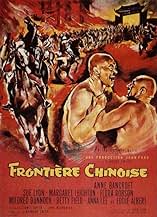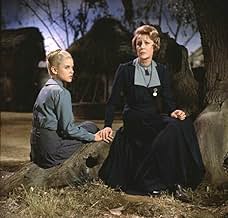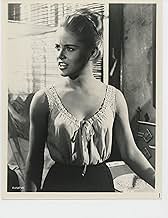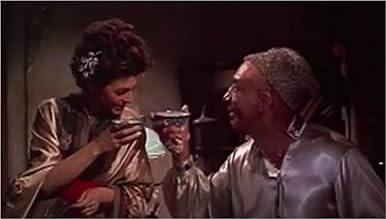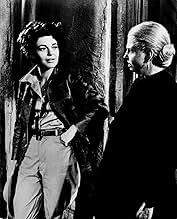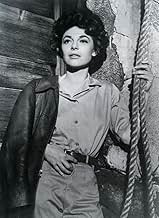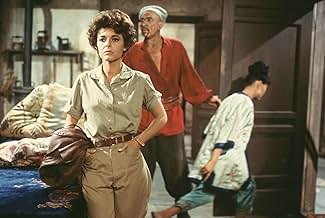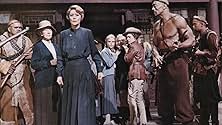VALUTAZIONE IMDb
6,7/10
2878
LA TUA VALUTAZIONE
Nella Cina del 1935, sette devote missionarie cercano di proteggersi dalle avances di un barbaro signore della guerra mongolo e della sua spietata banda di guerrieri.Nella Cina del 1935, sette devote missionarie cercano di proteggersi dalle avances di un barbaro signore della guerra mongolo e della sua spietata banda di guerrieri.Nella Cina del 1935, sette devote missionarie cercano di proteggersi dalle avances di un barbaro signore della guerra mongolo e della sua spietata banda di guerrieri.
- Regia
- Sceneggiatura
- Star
- Premi
- 1 candidatura in totale
Lee Kolima
- Warrior
- (non citato nei titoli originali)
Recensioni in evidenza
"Seven Women" is the last feature film of John Ford, arguably the greatest director the United States has yet produced. After a half century of film making, Ford ended his fabled career with a wide screen feature about women in peril at a Chinese mission. Infirm and alcoholic, he filmed it on an MGM sound stage; MGM then cut it and tossed it away on the bottom half of a double bill.
Today, the film is little known and seldom seen. It is far from Ford's best work, yet there is power and believability in many of the lead performances, and power in the arc of the story. Anne Bancroft shines as a feisty New York doctor who ultimately sacrifices herself to save the other missionaries -- many whom she doesn't agree with -- from brutal deaths at the hands of Chinese bandits. Her work here is more forceful and better realized than her role of Mrs. Robinson, done two years later.
The best gift MGM/Sony could give lovers of serious cinema is a clean print of this forgotten film. Its sets are often glaringly artificial, and some of the secondary players are over the top (an old weakness of Ford's) as well as miscast, but "7W" is a far better film than Hollywood legend has told us.
Today, the film is little known and seldom seen. It is far from Ford's best work, yet there is power and believability in many of the lead performances, and power in the arc of the story. Anne Bancroft shines as a feisty New York doctor who ultimately sacrifices herself to save the other missionaries -- many whom she doesn't agree with -- from brutal deaths at the hands of Chinese bandits. Her work here is more forceful and better realized than her role of Mrs. Robinson, done two years later.
The best gift MGM/Sony could give lovers of serious cinema is a clean print of this forgotten film. Its sets are often glaringly artificial, and some of the secondary players are over the top (an old weakness of Ford's) as well as miscast, but "7W" is a far better film than Hollywood legend has told us.
7 Women (1966)
Anne Bancroft fans, check out the forgotten drama 7 Women. She plays a tough, capable woman doctor sent to a missionary in China. This isn't important, but her short, curly hair is just adorable. What is important is the setting: a small village with limited resources and impending doom. Margaret Leighton heads up the missionary, and even though she's received word that a ruthless Mongolian bandit is headed their way, she refuses to flee to a safer location. She believes that the bandits will respect their Christianity and leave them unharmed, but when Anne arrives, she scoffs at the notion that religion will protect them.
Eddie Albert and his pregnant wife, Betty Field, need Anne's services the most. As an older woman, the pregnancy could have complications, but they also refuse to leave. Sue Lyon is an impressionable girl who first looks up to Margaret and then Anne. Flora Robson and Mildred Dunnock are also in the supporting cast. What can seven women and one useless man (sorry, Eddie) do when faced with such terrible danger? This very tense drama has a lot going for it, but strong women beware: it's upsetting. You won't see the twists and turns coming, and when they happen you'll probably be in shock for a while. But you will think Anne Bancroft is the bravest lady ever.
Eddie Albert and his pregnant wife, Betty Field, need Anne's services the most. As an older woman, the pregnancy could have complications, but they also refuse to leave. Sue Lyon is an impressionable girl who first looks up to Margaret and then Anne. Flora Robson and Mildred Dunnock are also in the supporting cast. What can seven women and one useless man (sorry, Eddie) do when faced with such terrible danger? This very tense drama has a lot going for it, but strong women beware: it's upsetting. You won't see the twists and turns coming, and when they happen you'll probably be in shock for a while. But you will think Anne Bancroft is the bravest lady ever.
I wonder what feminists feel about this film. I found this work to be a fascinating look at women by a male director that can compare with two other cinematic works: Paul Mazursky's "The Unmarried Woman" and Muzaffar Ali's "Umrao Jaan". Strong women, weak women, lesbians, and immature girls, are contrasted with cardboard male characters that are never fully developed and are obviously no match to the array of women portrayed in the film. The men are painted so negatively that one begins to wonder if Ford thought Asian men had more brawn than brain--a strange view that has gained currency in Hollywood cinema.
I applaud Ford's decision to cast Anne Bancroft in this role. This is one of her strong performances. She makes even the most vapid films look elegant with her roles ("Lipstick", "Little Nikita", to name just two). Ford develops her role "7 women" on the lines of a Western gunslinger--only there are no gunfights. The woman has a weapon: sex. That weapon can down all the bad guys faster than it takes to down Mexicans, Red Indians, rustlers, bank-robbers. In this film these bad men are Chinese/Mongolian thugs. Established thespians Dame Flora Robson and Margaret Leighton are totally eclipsed by Bancroft's riveting performance.
What Ford wanted I guess was to stun the viewer with the ending--the twist preceded by the gradual softening of the Bancroft in men's clothes to the Bancroft in women's clothes and the acceptance of male superiority. Most critics have found the end facile but I found the end was powerful as it makes you review and reconsider the strength of the lead character.
The film questions established views on religion; evidently Ford was old enough to have seen enough to choose to make this film in the evening of his life. In his films, Ford's women are as interesting as any other aspect of his cinema and this film provides ample fodder for those interested in studying this element of Ford's work.
However, for a 1966 film, the studio sets for the film look too artificial for the serious cinema the film offers. If anything, the film makes the viewer think!
I applaud Ford's decision to cast Anne Bancroft in this role. This is one of her strong performances. She makes even the most vapid films look elegant with her roles ("Lipstick", "Little Nikita", to name just two). Ford develops her role "7 women" on the lines of a Western gunslinger--only there are no gunfights. The woman has a weapon: sex. That weapon can down all the bad guys faster than it takes to down Mexicans, Red Indians, rustlers, bank-robbers. In this film these bad men are Chinese/Mongolian thugs. Established thespians Dame Flora Robson and Margaret Leighton are totally eclipsed by Bancroft's riveting performance.
What Ford wanted I guess was to stun the viewer with the ending--the twist preceded by the gradual softening of the Bancroft in men's clothes to the Bancroft in women's clothes and the acceptance of male superiority. Most critics have found the end facile but I found the end was powerful as it makes you review and reconsider the strength of the lead character.
The film questions established views on religion; evidently Ford was old enough to have seen enough to choose to make this film in the evening of his life. In his films, Ford's women are as interesting as any other aspect of his cinema and this film provides ample fodder for those interested in studying this element of Ford's work.
However, for a 1966 film, the studio sets for the film look too artificial for the serious cinema the film offers. If anything, the film makes the viewer think!
John Ford, usually with the reputation of misogynist, directed his last film surrounded by strong female characters and where the male characters are not particularly relevant. The movie is set in China, 1935, where a Civil War is taking place. Anne Bancroft, a female doctor who is also an atheist, says: "I spent years in slum hospitals. I never saw God come down and take care of anyone". Ford, with his catholic roots, allows himself to be pessimistic. Even when Margaret Leighton, a supposed strong believer is confronted by the female doctor, she says: "I've always searched for something that... isn't there. And God is not enough. God help me - He isn't enough".
The title refers to seven women, but the fact is that there are eight: What led us to believe that Anne Bancroft is excluded from the beginning? She wears man's clothes, she smokes and drinks. The loner Bancroft, condemned to always walk alone, like Ethan Edwards in "The Searchers". And what about the final scene, with a rare beauty, where the viewer isn't allowed to watch her fall? She is dressed in woman's clothes for the first time and is prepared to a truly catholic gesture, the sacrifice. "Seven Women" is a beautiful film, almost perfect. Towards the end, we become aware that Mr. Ford will live eternally.
The title refers to seven women, but the fact is that there are eight: What led us to believe that Anne Bancroft is excluded from the beginning? She wears man's clothes, she smokes and drinks. The loner Bancroft, condemned to always walk alone, like Ethan Edwards in "The Searchers". And what about the final scene, with a rare beauty, where the viewer isn't allowed to watch her fall? She is dressed in woman's clothes for the first time and is prepared to a truly catholic gesture, the sacrifice. "Seven Women" is a beautiful film, almost perfect. Towards the end, we become aware that Mr. Ford will live eternally.
7 Women (1966)
*** (out of 4)
John Ford's final film is one you really wouldn't expect to see from him but I guess it goes to show what a great director he was as he could end his nearly fifty-year career with something fresh and original. The film takes place in 1935 China as a free-wheeling and free-spirited doctor (Anne Bancroft) comes to work at a missionary where she immediately clashes with the head of the mission (Margaret Leighton). The head doesn't agree with the doctor's way of life, which includes smoking, drinking, profane language and of course not believing in God. Soon the doctor is battling this but then a plague breaks out in the mission and then they come under attack from some rebels. I'm not sure if stunned is too strong of a word but that's what my feelings were going through this film. I've seen at least fifty John Ford movies and I never thought I'd see something like this one. The attitude of the Bancroft character just seems like something the director would stay away from and the anti-religion stance was so strong that again I couldn't believe this was something from Ford. I think if you showed this movie to the biggest of film buffs and didn't tell them who the director was I doubt they'd ever guess it was someone like Ford. I really appreciated the 60s fling thrown into the picture because you can obviously tell that they were taking a 60s woman and putting her into this situation. There's a bit about the doctor leaving America because a woman couldn't get a fair shake at a good career and again I wonder if they were standing up for women's rights. The film also has bits of lesbianism, the religious hypocrites and a strong sense of sexuality. The movie certainly isn't ahead of its time considering this was 1966 but it's still impressive stuff. Bancroft is downright marvelous here and turns in a very memorable performance. I must admit that I fell in love with her character as you have to respect the toughness that the actress brings to the role. I believed every second of it and there's just a certain fire to Bancroft that clearly shows up on the screen. Leighton is one of those love-to-hate performances and makes for a great villain. Sue Lyon, best known from Kubrick's LOLITA, turns in a fine performance. We even get Woody Strode in a small role as one of the warriors. The film's pacing is a very slow one and it feels like the movie is a lot longer than its 86-minute running time but this isn't a negative thing as I never got bored. I was certainly surprised to see how much Ford managed to cram into the short running time. His direction here contains some of his softest touches but they all work. It's a shame this movie isn't mentioned more when people discuss his career but it's certainly a good and original way for him to go out.
*** (out of 4)
John Ford's final film is one you really wouldn't expect to see from him but I guess it goes to show what a great director he was as he could end his nearly fifty-year career with something fresh and original. The film takes place in 1935 China as a free-wheeling and free-spirited doctor (Anne Bancroft) comes to work at a missionary where she immediately clashes with the head of the mission (Margaret Leighton). The head doesn't agree with the doctor's way of life, which includes smoking, drinking, profane language and of course not believing in God. Soon the doctor is battling this but then a plague breaks out in the mission and then they come under attack from some rebels. I'm not sure if stunned is too strong of a word but that's what my feelings were going through this film. I've seen at least fifty John Ford movies and I never thought I'd see something like this one. The attitude of the Bancroft character just seems like something the director would stay away from and the anti-religion stance was so strong that again I couldn't believe this was something from Ford. I think if you showed this movie to the biggest of film buffs and didn't tell them who the director was I doubt they'd ever guess it was someone like Ford. I really appreciated the 60s fling thrown into the picture because you can obviously tell that they were taking a 60s woman and putting her into this situation. There's a bit about the doctor leaving America because a woman couldn't get a fair shake at a good career and again I wonder if they were standing up for women's rights. The film also has bits of lesbianism, the religious hypocrites and a strong sense of sexuality. The movie certainly isn't ahead of its time considering this was 1966 but it's still impressive stuff. Bancroft is downright marvelous here and turns in a very memorable performance. I must admit that I fell in love with her character as you have to respect the toughness that the actress brings to the role. I believed every second of it and there's just a certain fire to Bancroft that clearly shows up on the screen. Leighton is one of those love-to-hate performances and makes for a great villain. Sue Lyon, best known from Kubrick's LOLITA, turns in a fine performance. We even get Woody Strode in a small role as one of the warriors. The film's pacing is a very slow one and it feels like the movie is a lot longer than its 86-minute running time but this isn't a negative thing as I never got bored. I was certainly surprised to see how much Ford managed to cram into the short running time. His direction here contains some of his softest touches but they all work. It's a shame this movie isn't mentioned more when people discuss his career but it's certainly a good and original way for him to go out.
Lo sapevi?
- QuizAnne Bancroft recalled producer and director John Ford's tearing pages out of the script and described him as "Marvelous but loony."
- BlooperDr. Cartwright's hairstyle is not out of place for 1935. Dr. Cartwright is a strong, independent woman and it is not unusual for her to have this type of hairstyle - see Amelia Earhart. Besides, short hair worn off the shoulder was a very popular style in the 1930s.
- Citazioni
Dr. D.R. Cartwright: [to Tunga Khan, Bandit Leader] So long, ya bastard!
- Curiosità sui creditiPROLOGUE: "1935: North China near the border of Mongolia...A land of feudal war lords and marauding bandit armies...A time of lawlessness and violence."
- ConnessioniReferenced in MGM 40th Anniversary (1964)
- Colonne sonoreJesus Loves Me
(uncredited)
Words by Anna B. Warner and David Rutherford McGuire
Music by William B. Bradbury
Sung by Sue Lyon and the children
I più visti
Accedi per valutare e creare un elenco di titoli salvati per ottenere consigli personalizzati
- How long is 7 Women?Powered by Alexa
Dettagli
- Data di uscita
- Paese di origine
- Lingue
- Celebre anche come
- 7 Women
- Luoghi delle riprese
- Aziende produttrici
- Vedi altri crediti dell’azienda su IMDbPro
Botteghino
- Budget
- 2.300.000 USD (previsto)
- Lordo in tutto il mondo
- 228 USD
- Tempo di esecuzione
- 1h 27min(87 min)
- Colore
- Proporzioni
- 2.35 : 1
Contribuisci a questa pagina
Suggerisci una modifica o aggiungi i contenuti mancanti


